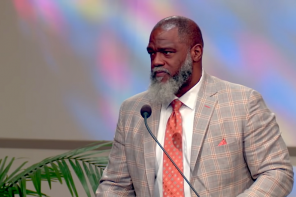If Margaret A. Farley’s fine theo-ethical work causes “grave harm to the faithful,” Catholics live very graced lives. War, poverty, ecocide, racism, colonialism, and sex and gender injustices of all sorts come to mind in the “grave harm” category. But not in the wildest imagination of anyone other than a Vatican bureaucrat would Dr. Farley’s sexual ethics qualify. How fortunate we are to have a scholar of her caliber, and how appropriate that she is appreciated widely. Recent attention to her work only serves to deepen her impact and broaden her audience; 24 hours after news broke of the Vatican censure, the book was propelled from an Amazon ranking of 142,982 to 16.
The June 4 Notification from the Congregation for the Doctrine of the Faith (CDF) titled “Regarding the Book Just Love: A Framework for Christian Sexual Ethics by Sister Margaret A. Farley, R.S.M.,” left many scandalized by the intellectually embarrassing and morally tawdry work of a group that obviously needs a permanent vacation. William Cardinal Levada and company at the CDF are simply out of their league theologically when it takes them six years (the book was published in 2006) to comment on an important work—and they still get it wrong.
A first-year graduate student could have handled the analysis in a week. S/he would have figured out that Dr. Farley was dealing with ethical method (how we frame and approach moral questions), not defending the Catechism of the Catholic Church. The Grawemeyer Award committee that chose Margaret for that prestigious and generous prize ($200,000 is real money in the theological business) realized Margaret was doing an outstanding job as a moral theologian in the broad interreligious conversation that is now the gold standard in the field.
Vatican interlocutors, who obviously have no clue about such matters, only embarrass themselves by publishing their ignorance in six languages. They leave the distinct impression that they are oblivious to the fact that postmodern ethical analysis emerges from multi-disciplinary, multi-religious discussions grounded in concrete actions for justice.
A scholar of Margaret Farley’s stature must terrify the staff of the CDF. She is, after all, the Gilbert L. Stark Professor Emerita of Christian Ethics at Yale Divinity School, a past president of the Catholic Theological Society of America (which gave her its highest award in 1992), as well as a past president of the Society of Christian Ethics. Dr. Farley holds 11 honorary degrees. In addition to seven books, she has contributed more than 100 chapters and papers to the field. Her lengthy resume of lectures, workshops, and consultations attests to the fact that this modest woman of quiet confidence is simply an excellent scholar.
Dr. Farley’s scholarly work is characterized by a careful, reasoned realism about the human condition. She brings a thorough grounding in the Christian tradition with an emphasis on Catholic thought to her books on commitment, embodiment, respect, and, in the most recent and controversial one, on love. Rather than embrace her project and explore, as she does, the range of ways that good people try to love—with an emphasis on the demands of justice in every intimate relationship—the CDF theologians boiled down her opus into five cherry-picked nuggets on sex and marriage that reflect their priorities, not hers. They missed the forest for the trees. Their statement is deeply insulting, not to mention morally suspect, in that such a stellar scholar’s reputation is impugned. As my mother would say, “Consider the source.”
I do not traffic in ulterior motives, nor is it especially productive to speculate on why Margaret Farley, like Dr. Elizabeth Johnson, a Sister of St. Joseph of Brentwood and a theologian at Fordham University, was singled out for scrutiny. But their canonical vulnerability as members of “an Institute of Consecrated Life” plays a significant role in their selection for negative attention. There are other women theologians who are not members of congregations whose views parallel, and in some instances outdistance, Dr. Farley’s on contested issues. They/we are simply not canonically vulnerable in the same way.
The Roman men are hell-bent on reining in American nuns, if only to prove that they can rein in somebody in a world that pays them increasingly little heed. They fear that such intellectually powerful and theologically persuasive women, who identify with the institutional Roman Catholic Church through their membership in canonical communities, will trump them in the public arena.
This is what happened when Sister Carol Keehan, a Daughter of Charity, and Sister Simone Campbell, a Sister of Social Service, parted company with the United States Conference of Catholic Bishops not once, but twice, in the health care debates. Their Catholicism trumped the Catholicism of the bishops in the minds of legislators and perhaps of President Obama himself. So it is with Margaret and Elizabeth that their well-reasoned, experience-encompassing, pastorally sensitive work simply trumps the bishops’ tired repetition of their own outdated thinking.
The Notification’s five little points need no rehearsal. Her critics simply miss the fact that Margaret Farley does not do ethics the way that they do. She does not share their ethical priorities on what Catholic moral theologian Daniel C. Maguire calls matters of the “pelvic zone.” Her scope is justice writ large—beginning in places where people are oppressed, violated, and demeaned. That the Vatican places masturbation at the top of its list highlights its perverted priorities in a deeply troubled world.
It is impossible to imagine the discourse as the men took under their scholarly consideration Margaret’s understated, but nonetheless robust, affirmation of women finding “great good in self-pleasuring… something many had not experienced or even known about in their ordinary sexual relations with husbands or lovers” (p. 236). I am confident that this came as unwelcome news to many of the men gathered. But the fact that they would dwell on it speaks volumes about their ethics and their rapidly eroding power. Sexual power is power, and more and more women have it. Apparently the struggle to wrest it back is high on the agenda of those who live on the 110 acres called the Vatican.
A more adequate understanding of Farley’s theological project can be gleaned by looking at three elements by which every scholar is measured: work, students, and impact. Farley’s work speaks for itself. Just Love is a standard ethics textbook in many seminaries and universities. Ironically, as noted earlier, it became a bestseller courtesy of the Notification. Thanks, guys. Even in retirement, she is a much sought after lecturer and writer whose wisdom has influence.
Her greatest influence is on her countless grateful students. While I never had the privilege of studying with her, many of my friends and colleagues who did speak of her with “just love.” She is rigorous to a fault, generous with her time and insights, and encouraging of her student colleagues to think for themselves outside the many boxes that litter academe. She is possessed of a rectitude they seek to emulate.
Two such students, Marie M. Fortune and Kate Ott, are sterling examples of Margaret’s influence. Marie studied for the ministry at Yale Divinity School in the early 1970s. Encouraged by Margaret, she branched out beyond the parish to engage in specialized work with women who experience violence. Dr. Fortune founded the Center for the Prevention of Sexual and Domestic Violence, now the FaithTrust Institute, in Seattle, Washington, “a national, multicultural training and education organization with global reach working to end sexual and domestic violence.” It is the go-to place for work on religion and violence. Dr. Fortune’s book, Love Does No Harm, shows the strong influence of her professor and friend, Dr. Farley, who preached at her ordination and encouraged her to work toward a safer world.
Kate Ott, who graduated from YDS in 2000 with a Master of Arts in Religion, is another example of Margaret’s kind of scholar. She went on to do a doctorate in Christian Social Ethics at Union Theological Seminary, then joined the staff of the Religious Institute, whose “mission is to change the way America understands the relationship of sexuality and religion.” She directed a study entitled “Sex and the Seminary: Preparing Ministers for Sexual Health and Justice,” a very helpful push to schools to upgrade their offerings in sex education. Dr. Ott’s current work on children’s moral agency is founded on the kind of “just love” that she learned from Margaret. The pattern is clear.
The impact of Margaret Farley’s work will be measured in many ways, but none will be more accurate than an assessment of her longterm commitment to women who live with HIV/AIDS in Africa. In 2002, Margaret met with a group of African women theologians to discuss the pandemic in sub-Sahara Africa where women are the vast majority of those who suffer. The result was practical, not theoretical—the founding of a now-flourishing NGO, All-Africa Conference: Sister to Sister, with support from Margaret’s community, the Sisters of Mercy. She still makes regular visits to Uganda and Cameroon to teach and learn as a collaborator.
The organization “brings together women religious so that they may address the crisis of HIV and AIDS by listening to, learning from, and empowering one another to collaborate in strategies for prevention and care in response to the pandemic. The essence of the AACSS is the bonding that exists between Sister to Sister.” Workshops, retreats, classes, and solidarity in country-specific forms all strengthen women to break through the fear and shame and cope with the pandemic both medically and spiritually. This work embodies “just love,” and it has a broad, life-giving impact.
Long after the Vatican’s Notification has been forgotten, generations will recognize that the HIV/AIDS pandemic occasioned a seismic shift in moral theology. Real world experience drives the discussion. Margaret Farley’s name will forever be associated with Catholic moral theology that does justice. Notify that!




